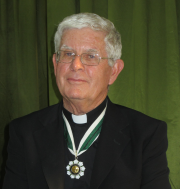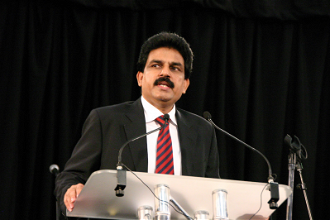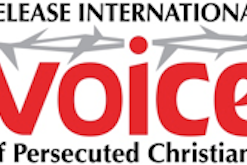Believer encountering believer in Pakistan

Fr Robert McCulloch SSC
Fr McCulloch, the Australian Procurator General of the Columban Missionaries, gave the following address to the Union of Superiors General in Rome on 7 April, celebrating the 50th Anniversary of Nostra Aetate. He worked in Pakistan for more than 30 years, and in 2012 was awarded the Sitara, the country’s highest civilian honour, for his services to the country in health and education.
Given that three Christian people in Pakistan have been sentence to death for blasphemy in the last three weeks, what I will say about believer encountering believer in Pakistan has a special sensitivity. You will be aware of the case of a Catholic believer in the Punjab, Asia Bibi, an illiterate 35 year old married woman and mother, who politely declined the invitation of Muslim believers to change her religion and become a Muslim, with the result that she has been found guilt of blasphemy and sentenced to death. Last week in Lahore Sawan Masih was found guilty of blasphemy for defending his faith during an alcohol-inspired “dialogue” with a Muslim neighbour and has also been sentenced to death.
This is one hand of “the believer encountering believer” dialogue in Pakistan. The other hand is best illustrated by an Urdu proverb “dil se dil tak rah hoti ha”: “the best road is the road that runs from one heart to another”. This, of course, is the same as the motto of Blessed John Henry Newman “cor ad cor loquitur” which I think he borrowed from St Francis de Sales and which were used respectively during the difficult dialogical days of 19th century England and 17th century Geneva.
The dialogical encounter of believer encountering believer in Pakistan is one of fundamentalist and legal threat, to the extent of “dungeon, fire and sword”, balanced by a genuine openness in the Pakistani heart, whether Muslim, Christian, or Hindu, that has endured in spite of the political manipulation of Islam by military dictators, in spite of a biased educational syllabus, in spite of prejudiced Islamic television media, and in spite of imported and foreign-funded Islamic fundamentalism.
It is easy to be swayed by international media reporting which is light on detail and low in analysis and come to the conclusion that Pakistan has been taken over by violent Islamic fundamentalists. This is an aspect of the context which gets its corrective balance from looking into the hearts and souls of Pakistani believers. Another Urdu proverb says “ek hath se tali nehin bajti”; “you can’t clap hands with just one hand”.
Pakistan was founded 67 years ago. Its foundational premise is that believers of different faiths cannot live together in spite of the experience over 400 years of believers in the Punjab, the Sindh and elsewhere to the contrary. The two nations were born on 14-15 August 1947: freedom at midnight.
I think that expressions of Islamic militancy and fundamentalism in Pakistan and equally disturbing militant and fundamentalist Hindu expressions in India from the BJP which can militate against encounters between believers are nurtured by the unresolved hatred between the two countries that go back to the migrations, the murders, and the brutality of the partition days which remain unresolved, and for which there has been no process of reconciliation or mutual forgiveness. Because of this, national sentiment in Pakistan is prone to religious excess especially when the slogan is raised: “Islam is in danger”.
However, the founding ideology for Pakistan, which Mohammad Ali Jinnah presented, totally rejects religious extremism, religious excess, and religious fundamentalism as alien to being a Pakistani: this is why the founders of the fundamentalist political parties, whose followers now propose the imposition of Sharia law and who are unable to condemn Taliban and religious violence, were themselves bitter opponents of Jinnah and his vision for Pakistan.
On 11 August 1947, three days before independence, Jinnah said to the members of the first constituent Assembly: “You are free to go to your temples, you are free to go to your mosques or to any other place of worship in this State of Pakistan. You may belong to any religion or caste or creed – that has nothing to do with the business of the State.
We are starting in the days when there is no discrimination, no distinction between one community and another, no discrimination between one caste or creed and another. We are starting with this fundamental principle that we are all citizens of one State.”
This is part of the context for the dialogue between believers in Pakistan. At a recent international Symposium on the mission of the Catholic Church in Asia, Fr Adolfo Nicolas, SJ, superior general of the Jesuits, said that religion is closer to the sense of music than to the rational encounter of the mind. Taking this observation further, I would like to note that, as believers who encounter one another in a dialogue, it is important that we know what sort of music we are playing and listening to, and what instruments we are using, and to recognize where we are while engaging with the music. In other words, we need to be very aware of the context of our encountering and dialoguing to be able to recognize the richness of the religious belief.
Pakistan has 184,000,000 people. The population of Karachi is more than the total population of Australia. The great majority are Muslim, both Sunni and Shia, of whom Sunnis are the majority. There is also a small but significant number of Ismaelis. As long as I can remember, the official government statistic for Christians has always been 1,000,000. However, in October 2012 during a diplomatic reception in Rome, the Pakistan ambassador to the Holy See said that there were 3,000,0000 Christians in Pakistan so this can be taken as an official statistic. Many observers believe that the number is closer to 5,000,000.
Religion is important to Pakistanis of whatever faith. Unfortunately Pakistani constitutional and legal terminology has divided the population on the basis of religion into “majority” and “minority”. Governor Ishrat ul Ebad Khan of the southern province of Sindh has said that if he could eliminate this divisive official terminology then Pakistanis would be far down the path of religious harmony and respect. In engaging in dialogue and encounter with Muslims, Christians in Pakistan have to make a conscious and deliberate choice to move beyond the dynamic of isolation, separation and ghetto-ization that is inherent in this discriminatory “majority-minority” terminology.
Similarly, Muslims also have the challenge to break out from and move beyond the “Us-Them” dynamic. Many Christians and Muslims have been able to appropriate the personal and cultural empowerment required for this attitudinal change. Education, solidarity in works of compassion after major earthquakes and floods, unified social reaction against the oppression of impoverished workers, and common stands for the rights of women and children have been means and indicators in this.
However much remains to be done in empowering Christians to overcome the stigma of belonging to what is still regarded as a powerless “minority” that is merely tolerated in Pakistan, and to enable Muslims to break the chains of the social, religious, cultural, and intellectual construct which they have taken on through their confidence in being the powerful “majority”. In this regard, I think Rabbi Jonathan Sacks has given us a way forward in his address entitled “Creative Minorities” which was the 2013 Erasmus Lecture. Rabbi Sacks asks what would happen if we were convinced that the God who created biodiversity cares for human diversity, an apt challenge for the both Christian believers in Pakistan.
In a similar vein, in September 2013, Baroness Sayeeda Warsi, UK minister for Faith, a Muslim of Pakistani-origin, said that she challenges British Muslim congregations and groups to take on a universal heart in terms of the first words the Quran which invoke God in terms of His unlimited compassion and mercy for all.
I hope this has not sounded too grim about the reality of and the possibility of dialogue.
You are probably asking if there is any hope in Pakistan for the dialogue we are considering today in terms of believers encountering one another. Yes, indeed, it can and it is!
I should like to refer to but move the discussion further beyond the levels of acquaintance and friendship. I have found that friendship is the enabling matrix for the encounter of believers. However the encounter of believers goes beyond the level of friendship but, at the same time, deepens and enriches the quality of the enabling friendship. Believers in dialogue are people who are ready for the journey between each other’s hearts; and the travel agent who makes the preparations and does the booking for this journey is friendship.
But I do think that saying “I have many Muslim friends” is not to explore the full possibilities of what the encounter of one believer with another is. Friendship leads to so much. Looking at the negative side of the coin of intra-faith friendship in Pakistan helps to illustrate the positive side. There are Muslims in Pakistan who recoil from any sort of contact with Christians. And there are Christians who are so embittered by the injustice, contempt, threats, and multi-faceted discrimination they have endured that they will not have anything to do with Muslims and for whom friendship is impossible. Each such group finds reinforcement for their attitudes in friendship solely in their own religious-cultural group.
But a believer encountering a believer is much more than the relationship in friendship, however jolly or formal, between people. Positively, the great thing is that so many Pakistanis are in comfortable and easy relations with one another, a relationship of friendship, in the places where they live and work. These are the widespread experiences which journalists miss when they report on violence, Taliban, terror, rape and corruption in Pakistan. Perhaps one of the things that make citizens cling to one another in friendship, no matter what their religion, is the spiraling culture of urban violence that threatens everyone without regard to religious belief.
It is the explicit presence of religion which characterizes the encounter of believer with believer and moves it beyond the level of friendship. But obviously, the conscious engagement with the religious dimension moves the friendship to another personal and more intimate level: to restate the Urdu proverb “dil se dil tak rah hoti ha”: “the best road is the road that runs from one heart to another”.
It has been my experience that the two richest contexts for the encounter in Pakistan between believers who are Muslim and Christian have been in fasting and in working together in works of compassion.
We fast well in Pakistan: Muslims, Christians and Hindus, in our own way and in our own time and for our own reason. But we fast. You are familiar with Ramadan, called Ramzan in Pakistan. During Lent, Catholics fast for either 12 hours from 6am-6pm without eating or drinking anything, or for 23 hours and eat and drink for just one hour; and this includes not drinking water. Many Pakistani Muslims stand back and say that it is the Catholics who keep the real fast. In times of fasting, everyone makes exceptions for and understands the situation of those who fast. On being offered something during the fast time, and to refuse quietly by saying “Thank you, I am in the fast” elicits immediately the request “Pray also to God for me”. The religious heart of Pakistan is very wide in this regard. But what moves it into the context of believer encountering a believer is when two people, Muslim and Catholic, who are friends actively support and encourage one another during their respective fasts. Those who keep the fast know the particular rhythms involved: the first few days adjusting to blood-sugar levels, the first ten days of trudging along, the next week of spiritual warfare and intense temptation, followed by days when food is not the issue but the reality of God’s presence. This experience becomes the “stuff” for the encounter between believers: to visit at the end of the fast, to have just a mouthful to eat together, to ask and talk about the experience of God during the time of fasting, to pray a little together often by sitting in silence, and then to embrace one another happily, and to leave… until tomorrow. There is little talking but the road of the hearts is being well-travelled.
Sometimes it seems to me that we do not use the obvious means we have to enable the encounter of believers: our own well-ignored tradition of fasting, and the five times we are called to pray the Liturgy of the Hours.
The other area that I have found most powerful and enriching in Pakistan for the encounter between believers is working together in works of compassion. The Church in Pakistan has lots of problems but I think we wrote the book that Pope Francis copied from when he was writing about works of compassion in Evangelii gaudium. Floods, earthquakes, people in need, people suffering, the plight of children, women giving birth without any skilled attendants, men who feel so helpless in helping their families after they have lost everything, useless government agencies, in and out international NGOs, hunger, sickness. You know the scenario as it is so often repeated.
This has been a special opportunity and context in Pakistan for the encounter between Muslim and Christian believers which has continued beyond the time-frame of the crisis. The cultural barriers of “majority-minority” divisions break down before the call to manifest the compassion of God. Responding together to natural crises has developed the ability of Catholic and Muslim health workers and professionals to talk about how they can be agents of the compassion of God and to listen with interest and respect about what both the Holy Bible and the Quran say about compassion and mercy. This is a small good that God can bring out of evil!
Is this much? God knows. But it is better to light the candle of believers encountering one another than to curse the darkness of fundamentalism and say that nothing can be done. I am, however, convinced that just as the celebration of the liturgy is the primary theology from which and about which all other discussion, writing and teaching emerges as secondary theology, so the dialogue of life and the reality of believer encountering believer is the primary theology about which all seminars, conferences and councils on interreligious and interfaith dialogue stand in relation as secondary theology.
I am sure so many other Catholics in Pakistan and our confreres and colleagues there can speak about the other ways they know of when believers are encountering believers.


















